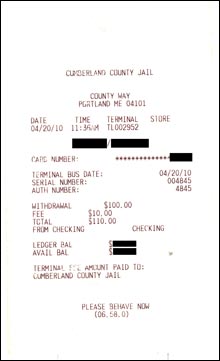
RECEIPT Massive fee profits police credit union. |
Arrested in Cumberland County without a big wad of cash on you? If you're going to bail yourself out, prepare to pay through the nose. There are two ATMs at the Cumberland County Jail. One, in an area accessible to the visiting public, charges $2 per transaction. The one behind bars, available only to people who have been arrested — who are nevertheless innocent until proven guilty — costs a whopping $10 per withdrawal.
Despite the ATM receipt saying "Terminal Fee Amount Paid To: Cumberland County Jail," the $10 really goes to the Portland Police Federal Credit Union, whose membership is limited to Portland Police Department, Cumberland County Sheriff's Office deputies, civilian employees of both agencies, and their families. (The PPFCU has no contract with Cumberland County, and the county receives no revenue from the machines, according to county finance director Vic Labrecque.)
The matter has gotten the attention of outgoing sheriff Mark Dion, incoming Sheriff Kevin Joyce, and Cumberland County Commissioner Malory Shaughnessy (who also chairs the state's Sentencing and Correction Practices Council), but change seems unlikely.
John Barry, the retired Portland cop who heads the PPFCU, declined to specify how much of his organization's $100,000-plus annual fee income was generated by the jail ATMs. Barry said the public machine in the lobby charged just $2 per transaction because "people who aren't incarcerated can come in and use that machine."
Then he defended the $10 fee for people trying to bail themselves out by saying arrestees have a choice — rather than withdrawing money, they could call a friend to bail them out: "I have a fee out back because a guy who has been arrested, he doesn't have to use that machine. It's as simple as that. If you don't want to use that machine, you don't have to use it."
When it was suggested that some people might not see the decision between paying such a steep fee or remaining incarcerated as a fair choice, Barry blew up. "Let them have a hard time understanding then. I don't have to explain it to you," he yelled angrily. Did he think that Cumberland County citizens had a right to understand the practices of an institution holding a monopoly on cash access for those in government custody? "No, I don't," Barry said.
The only other jail in the state with an ATM, Androscoggin's in Auburn, has a $2 transaction fee, the proceeds of which go to help indigent inmates. (In Aroostook County, if someone is arrested without enough cash on hand to post bail, a deputy will walk the prisoner across the street to a bank.)
The $10 fee is legal, according to John McKechnie, head of the National Credit Union Administration's Office of Public and Congressional Affairs. "There really isn't a limit on transaction fees like that," McKechnie said, though "the $10 sounds pretty high to me." Had he ever heard about a credit-union ATM with fees that high? "Sure," he replied. "Haven't you ever been to Vegas?"
In response to inquiries from the Phoenix, Sheriff Dion spoke with Barry, "and I told him that there could be a conflict over the two fee amounts," but added, "I'm not sure that they're inclined to change the fee structure."